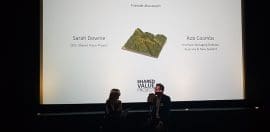Predictions for 2020: Shared value

4 February 2020 at 8:44 am
Looking to the year ahead, Helen Steel suggests the most important cultural and economic shifts we make this year will come from recognising that social and economic outcomes aren’t mutually exclusive, but mutually dependent.
Making predictions about the future is fraught with challenges; particularly in such tumultuous times. But if I consider the events currently impacting the globe, including Australia’s devastating bushfires, it’s difficult to overlook resilience as a priority.
The scale of these events is vast, and the impacts far-reaching; affecting tourism, agriculture, food production and spurring climate migration like we’ve never seen.
The Coronavirus epidemic, global trade tensions (and the realisation of Brexit), digital disruption and slowing economic momentum completes a backdrop of unmatched uncertainty as we begin a new decade. And so the leading agenda for 2020 becomes how do we convert our current status of fragility to one of long-term stability?
My optimistic prediction is that as the experts continue to run the ruler over the fiscal repercussions of socio-environmental challenges, the correlation between the two will become more apparent. We will recognise that social and economic outcomes aren’t mutually exclusive, but mutually dependent.
I believe this fundamental premise could trigger the most important cultural and economic shifts we make this year, if not this decade. And it’s already starting to happen within the business and investment communities, with recent commitments from the US Business Roundtable and BlackRock founder Larry Fink galvanising the imperative for companies to consider social issues.
For business, the practice of solving social issues profitably – or, creating shared value – is becoming vital risk mitigation amid rising volatility. It’s about moving beyond a nice-to-do to a need-to-do. From reactivity to proactivity, before commercial shocks occur.
This shift requires innovative thinking, in a traditionally binary environment where social and economic motivations have often been positioned in conflict with one another.
This is particularly important as “purpose-washing” gives rise to public scepticism. I suspect we’ll see a move towards more transparency and integrated reporting, making the standard corporate documents that few read obsolete.
Another critical step will be to engage and equip the next generation of political, business and community leaders to pursue a more resilient path. Whether a hope or prediction, I foresee this spurring big changes to our national education system, where we focus on fostering a culture of collaboration in our schools to solve challenges more holistically. We need to nurture a more versatile and diverse skill-set including relationship-building, problem-solving and collective resourcefulness.
Further, the future of work is rapidly changing. As automation and artificial intelligence makes many manual, repetitive jobs obsolete, the ability to innovate is gaining currency. Therefore, while we can’t compete with machines, we can commit to better preparing the emerging pool of human capital to lean in to creativity, in a world where adaptability is key.
But for this environment to thrive, it needs multi-layered support. And for it to have scale, it needs policy and regulatory intervention. In these ways, I anticipate that government can – and will – realise the systemic change that modern society demands and respond accordingly.
Ultimately, it’s a matter of reconsidering and repositioning how we measure success; as a nation and for the private sector – as the primary creator of wealth. In May, New Zealand’s finance minister introduced a world-first Wellbeing Budget; making it the first western country to design its entire budget around wellbeing priorities; namely, mental health, domestic violence and child poverty.
The great thing about transformative change is that it can all start with the actions of a single agent. It only takes one example to lead the way, and provide a template for others. And so NZ’s disruptive move kick-started the formation of the Wellbeing Economy Alliance – a network of countries and organisations (including Iceland and Scotland) which are developing frameworks to measure social, economic and environmental factors that go beyond GDP as the sole marker for economic success. This is particularly important as globalisation and technological advancements call for a system centred around inclusive growth; to ensure equal economic participation for all.
All of this progress is interdependent. But it starts with a change in mindset, towards long-term resilience over short-term reactivity. We must understand that socio-environmental issues are economic issues.
Some great inroads have been made in recent years, with shared value and purpose-led business becoming more widely accepted. But we have now reached a critical juncture, where we must turn this foundation into business as usual to ensure a resilient future.
This article is the first in a series of 2020 predictions from experts across the social sector.







